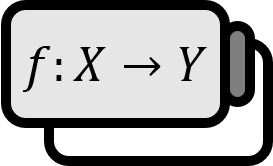Derivation of the Poisson Summation Formula
Formula
Let $f : \mathbb{R} \to \mathbb{C}$ be a Schwartz function. Then, $$ \sum_{n \in \mathbb{Z}} f(n) = \sum_{k \in \mathbb{Z}} \widehat{f}(k) $$
- Schwartz functions $f \in C^{\infty}(\mathbb{R})$ are functions whose magnitude $\left| f (x) \right|$ converges rapidly to $0$ when $x \to \pm \infty$.
- For $f$ and $\gamma \in \mathbb{R}$, $\widehat{f}(\gamma)$ represents the following Fourier transform: $$ \widehat{f} ( \gamma ) = \int_{\mathbb{R}} f(x) e^{-2 \pi i \gamma x} dx $$
Proof1
Let $$ F(x) := \sum_{n \in \mathbb{Z}} f ( x + n ) $$ then $F$ is $1$-periodic and the Fourier coefficients $\widehat{F}_{k}$ can be calculated as follows: $$ \begin{align*} \widehat{F}_{k} &= \int_{0}^{1} \sum_{n \in \mathbb{Z}} f(x+n) e^{-2\pi i k z } dx \\ =& \sum_{n \in \mathbb{Z}} \int_{0}^{1} f(x+n) e^{-2\pi i k z } dx \\ =& \sum_{n \in \mathbb{Z}} \int_{n}^{n+1} f(x) e^{-2\pi i k z } dx \\ =& \int_{\mathbb{R}} f(x) e^{-2\pi i k z } dx \\ =& \widehat{f} (k) \end{align*} $$ Following the Fourier expansion of $F$, we get $$ \sum_{n \in \mathbb{Z}} f(x+n) = F(x) = \sum_{k \in \mathbb{Z}} \widehat{F}_{k} e^{i k x } = \sum_{k \in \mathbb{Z}} \widehat{f} (k) e^{i k x} $$ By substituting $x = 0$, the following is obtained: $$ \sum_{n \in \mathbb{Z}} f(n) = \sum_{k \in \mathbb{Z}} \widehat{f}(k) $$
■
